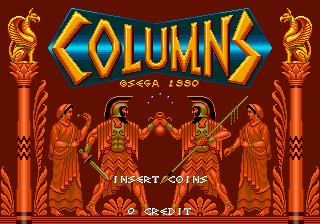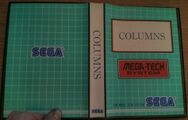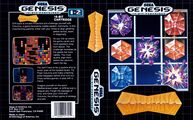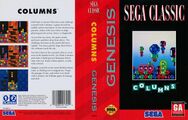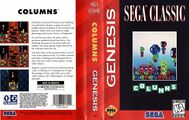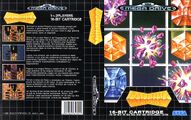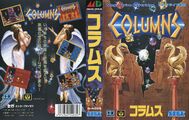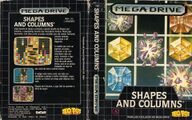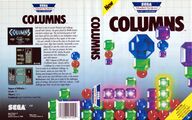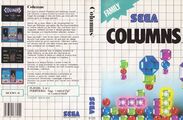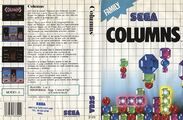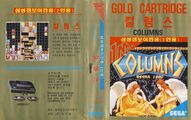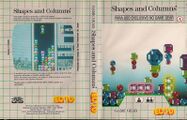Difference between revisions of "Columns"
From Sega Retro
| Line 263: | Line 263: | ||
| joystick_source={{num|12|page=116}} | | joystick_source={{num|12|page=116}} | ||
| mm=89 | | mm=89 | ||
| + | | mm_source={{num|2|page=78/79}} | ||
| playerone=85 | | playerone=85 | ||
| playerone_source={{num|5|page=50}} | | playerone_source={{num|5|page=50}} | ||
Revision as of 15:10, 2 September 2013
| Columns | |||||
|---|---|---|---|---|---|
| System(s): Sega System C, Sega Mega Drive, Sega Game Gear, Sega Master System, FM Towns, MSX, NEC PC-8801, NEC PC-9801 PC Engine, Sharp X68000, Super Famicom | |||||
| Publisher: Sega, SystemSoft Laser Soft Telenet Japan | |||||
| Developer: Sega, SystemSoft Telenet Japan, Laser Soft Compile SNES Media Factory, Marigul | |||||
| Genre: Puzzle | |||||
| |||||
|
CERO
Missing Parameter! |
Columns (コラムス) is a puzzle game created by Jay Geertsen in 1989. The rights were sold to Sega in 1990, who brought the game to the Sega System C arcade board, with its subsequent success seeing the game released on a wide variety of platforms. Columns is frequently seen as Sega's answer to Tetris, which although did not escape Sega platforms, was making a name for itself on Nintendo's Game Boy. In Brazil it is known as Shapes and Columns.
Gameplay
Columns is a falling-block puzzle game. Like Tetris, the aim of the game is to try and stay alive - "columns" fall from the top of the screen, landing on-top of each other, and should the "pile" reach the top of the screen, the game is over. Success is determined by strategic placing of columns, and as the game progresses, the rate at which the columns fall increases.
In Columns, each column is made up of three coloured jewels stacked on top of each other. If three or more jewels of the same colour are aligned horizontally, vertically or diagonally, the jewels will be destroyed, and any jewels placed above will fall downwards. Unlike Tetris, the reliance on gravity means gameplay is combo-driven - repeated combos will spawn a "magic jewel" (in most versions of the game), which when collided with a normal jewel will eliminate all jewels of that colour on-screen. Games are played on a 6x13 grid, and points are awarded by destroying jewels (players also receive a bonus for starting the game at higher difficulties). In the majority of versions, hints will be displayed for the player up until level 3.
There are six coloured jewels in total:
Many home versions of the game allow for the graphics to be changed, most notably the Sega Master System and Sega Game Gear variants, as well as home computer ports by SystemSoft.
Controls
There are only four buttons utilised in Columns. ![]() and
and ![]() move a falling column left or right across the screen, respectively, while
move a falling column left or right across the screen, respectively, while ![]() speeds up the rate at which the column falls.
speeds up the rate at which the column falls.
The remaining button is used to "rotate" the column as shown below:
There is no option to rotate the columns in the opposite direction. Columns can only be rotated while they are moving, however a certain amount of leeway (i.e. about a second) is given to columns which have just "landed".
Modes
Game modes differ depending on the version of Columns:
"Arcade"/Original
All versions of the game have an interpretation of the "arcade" (or "classic") columns described above - an theoretically endless game in which columns continue to fall until the screen is filled.
2-Player
"Standard" 2-player mode, found in the arcade version of the game is largely identical to the arcade mode above, except two players are supported. It is not a competitive mode, so players can join and leave at will. Some versions remove this mode for logistical reasons, for example, the Sega Game Gear port where the handheld nature of the console renders this mode largely pointless, and the PC Engine version, in which the console only has one control port as standard.
Versus
Offered in most non-arcade versions of the game, versus has two players compete against each other, the winner being the player who lasts the longest. Unlike other puzzle games of this nature (perhaps most notably, Puyo Puyo), there are no methods of "attacking" your opponent, so is very similar to the above.
Flash Columns
Flash Columns, featured in the Sega Mega Drive, Sega Master System and Sega Game Gear versions of the game, has the player must mine their way through a set number of lines to get to a flashing jewel at the bottom. The faster the player accomplishes this, the higher his or her rank will be.
Time Trial
Exclusive to the Mega Drive version, time trial involves wither the original "arcade" game or flash columns to be played as a three minute time-limited game.
Doubles
Also exclusive to the Mega Drive version, this can be seen as a cooperative two player mode, in which the original mode or flash columns can be played on the same screen.
Stone
Exclusive to the PC Engine version when playing on a PC Engine GT/TurboExpress (TODO)
Freeze
Exclusive to the PC Engine version when playing on a PC Engine GT/TurboExpress (TODO)
History
Development
Columns was originally conceived by Jay Geertsen while working at Hewlett-Packard in 1989. It was originally created for the HP-UX operating system (utilising the X Window System), however the relative obscurity of the platform, particularly amongst home consumers, saw ports to other systems. Nathan Meyers brought it to DOS for IBM PC customers (1989), Chris Christensen to the Macintosh (1990) and John Rotenstein for Windows 3.x (1990). It was also brought to the Atari ST in 1989.
In early 1990, Geertsen sold the rights to Sega, who has controlled the license ever since. Sega is not thought to own the code of the aforementioned versions, just the mechanics surrounding the game.
Legacy
Following its success in arcades, Columns was brought to the Sega Mega Drive, in the form of a very accurate arcade conversion. The Mega Drive Columns was the first puzzle game to hit the system in most territories - though Tetris had seen a Mega Drive release in Japan in 1988, legal issues forced it to be removed from shelves and the game has been rarely mentioned since. Columns is a relatively small game by Mega Drive standards, and so has been re-released multiple times across many compilations. It was also re-released several times between 1993 and 1996 in North America, presumably to try and clear old stock.
Columns was a launch title for the Sega Game Gear, which debuted in Japan in October 1990. It was also brought to the Sega Master System later in the year.
SystemSoft were given the rights to publish Japanese home computer versions of the game between 1991 and 1992, including the PC-8801, PC-9801 and Sharp X68000. MSX and FM Towns versions were handled by Telenet Japan, while a PC Engine port was brought to the system by Laser Soft. Perhaps most peculiarly, Media Factory were given the rights to produce a Super Famicom version, released in the very late year of 1999. It was distributed through the Japan-exclusive Nintendo Power rewritable cartridge service and is the only Sega property to see an official release on Nintendo's Super Famicom.
There have been multiple sequels to Columns, starting with 1990's Columns II: The Voyage Through Time and 1993's Columns III: Revenge of Columns. The System C version of the game was released as part of the Sega Saturn compilation, Columns Arcade Collection. The Mega Drive version has also been released on Steam and as part of the Wiis Virtual Console service. Multiple unlicensed versions of the game exist, as well as many clones.
Throughout its life, Columns has never achieved the same level of success as Tetris, however continues to see sequels to this day.
Physical Scans
System C Version
| Sega Retro Average | ||||
|---|---|---|---|---|
|
| N/A | |
|---|---|
| Based on 0 reviews | |
Template:ScanflyerTemplate:Scanflyer
Mega-Tech version
Mega Drive Version
| Sega Retro Average | |||||||||||||||||||||||||||||||||||||||||||||||||||||||||||||||||||||||||||||||||||||||||||||||||||||||||||||||||||||||||||||||||||||||||||||||||||||
|---|---|---|---|---|---|---|---|---|---|---|---|---|---|---|---|---|---|---|---|---|---|---|---|---|---|---|---|---|---|---|---|---|---|---|---|---|---|---|---|---|---|---|---|---|---|---|---|---|---|---|---|---|---|---|---|---|---|---|---|---|---|---|---|---|---|---|---|---|---|---|---|---|---|---|---|---|---|---|---|---|---|---|---|---|---|---|---|---|---|---|---|---|---|---|---|---|---|---|---|---|---|---|---|---|---|---|---|---|---|---|---|---|---|---|---|---|---|---|---|---|---|---|---|---|---|---|---|---|---|---|---|---|---|---|---|---|---|---|---|---|---|---|---|---|---|---|---|---|---|
|
| 80 | |
|---|---|
| Based on 29 reviews | |
| Mega Drive, US (Sega Classic) |
|---|
| Mega Drive, US (Sega Classic) (newer) |
|---|
Master System Version
| Sega Retro Average | ||||||||||||||||||||||||||||||||||||||||||||||||||||||||||||||||||||||||||||||||||||||||||||||||||||||||||||||||||||||||||||
|---|---|---|---|---|---|---|---|---|---|---|---|---|---|---|---|---|---|---|---|---|---|---|---|---|---|---|---|---|---|---|---|---|---|---|---|---|---|---|---|---|---|---|---|---|---|---|---|---|---|---|---|---|---|---|---|---|---|---|---|---|---|---|---|---|---|---|---|---|---|---|---|---|---|---|---|---|---|---|---|---|---|---|---|---|---|---|---|---|---|---|---|---|---|---|---|---|---|---|---|---|---|---|---|---|---|---|---|---|---|---|---|---|---|---|---|---|---|---|---|---|---|---|---|---|
|
| 84 | |
|---|---|
| Based on 24 reviews | |
Game Gear Version
| Sega Retro Average | |||||||||||||||||||||||||||||||||||||||||||||||||||||||||||||||||||||
|---|---|---|---|---|---|---|---|---|---|---|---|---|---|---|---|---|---|---|---|---|---|---|---|---|---|---|---|---|---|---|---|---|---|---|---|---|---|---|---|---|---|---|---|---|---|---|---|---|---|---|---|---|---|---|---|---|---|---|---|---|---|---|---|---|---|---|---|---|---|
|
| 80 | |
|---|---|
| Based on 13 reviews | |
| Game Gear, JP (Meisaku Collection) |
|---|
| Game Gear, KR |
|---|
|
FM Towns Version
| FM Towns, JP |
|---|
|
MSX Version
| MSX, JP |
|---|
<div style="margin:auto; max-width:Expression error: Unexpected < operator.px">
320x120px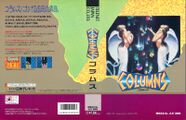 Cover
|
NEC PC-8801 Version
| NEC PC-8801, JP |
|---|
|
NEC PC-9801 Version
| NEC PC-9801, JP |
|---|
| <div style="margin:auto; max-width:Expression error: Unexpected < operator.px">
320x120px Cover
|
PC Engine Version
| Sega Retro Average | |||||||||||||||||||
|---|---|---|---|---|---|---|---|---|---|---|---|---|---|---|---|---|---|---|---|
|
| 75 | |
|---|---|
| Based on 3 reviews | |
| TurboGrafx-16, JP |
|---|
| <div style="margin:auto; max-width:Expression error: Unexpected < operator.px">
320x80px Cover
|
Sharp X68000 Version
Super Famicom Version
| Super Famicom, JP |
|---|
|
External Links
| Games in the Columns Series | |
|---|---|
| Columns (1990) | Columns II: The Voyage Through Time (1990) | Columns III: Revenge of Columns (1993) | Stack Columns (1994) | Super Columns (1995) | Columns '97 (1996) | Hanagumi Taisen Columns (1997) | Columns Arcade Collection (1997) | Columns GB: Tezuka Osamu Characters (1999) | Hanagumi Taisen Columns 2 (2000) | Columns Crown (2001) | Columns Jewel (2005) | Columns Deluxe (2008) | Jewelpet Kira Kira Mahou no Housekibako (2009) | Sega Ages Columns II (2019) | |
| Columns Taisen Mode Tsuki (1991) | Columns (Mame Game) (1997) | Columns (Pocket Boy) (1997) | Columns for Zaurus (2001) | Columns for Clié (2002) | |
| Unlicensed Columns games | |
| Super Columns (1990) | |
| Columns Related Media | |
| Columns・Columns II (1991) | |
| Hanagumi Taisen Columns Official Guide (1997) | Hanagumi Taisen Columns 2 Perfect Guide (2000) | |
- ↑ Ação Games, "Junho 1991" (BR; 1991-06-19), page 27
- ↑ Aktueller Software Markt, "November 1990" (DE; 1990-10-26), page 138
- ↑ Beep! MegaDrive, "July 1990" (JP; 1990-06-08), page 17
- ↑ Complete Guide to Consoles, "Volume III" (UK; 1990-08-xx), page 46
- ↑ Complete Guide to Consoles, "Volume IV" (UK; 1990-11-xx), page 28
- ↑ The Complete Guide to Sega, "" (UK; 1991-05-xx), page 45
- ↑ Console XS, "June/July 1992" (UK; 1992-04-23), page 128
- ↑ Electronic Gaming Monthly, "November 1990" (US; 1990-xx-xx), page 20
- ↑ Mean Machines: The Essential Sega Guide, "" (UK; 1993-11-18), page 32
- ↑ Famitsu, "" (JP; 1990-0x-xx), page 1
- ↑ The Games Machine, "Novembre 1990" (IT; 1990-1x-xx), page 83
- ↑ Joystick, "Octobre 1990" (FR; 1990-xx-xx), page 113
- ↑ Sega Mega Drive Advanced Gaming, "January 1993" (UK; 199x-xx-xx), page 91
- ↑ Mega Drive Fan, "October 1990" (JP; 1990-09-08), page 79
- ↑ Mega Play, "February 1991" (US; 199x-xx-xx), page 41
- ↑ MegaTech, "Xmas 1991" (UK; 1991-12-06), page 33
- ↑ Mean Machines Sega, "October 1992" (UK; 1992-09-xx), page 138
- ↑ Player One, "Février 1991" (FR; 1991-xx-xx), page 42
- ↑ Power Play, "9/90" (DE; 1990-08-17), page 122
- ↑ Sega Power, "July 1991" (UK; 1991-06-06), page 12
- ↑ Sega Power, "October 1991" (UK; 1991-09-05), page 53
- ↑ 22.0 22.1 22.2 Sega Pro, "December 1991" (UK; 1991-11-21), page 21
- ↑ Sega Pro, "April 1993" (UK; 1993-03-11), page 64
- ↑ Sega Saturn Magazine, "September 1995" (JP; 1995-08-08), page 85
- ↑ 25.0 25.1 Tilt, "Décembre 1991" (FR; 1991-1x-xx), page 71
- ↑ Top Secret, "Kwiecień 1995" (PL; 1995-xx-xx), page 57
- ↑ Tricks 16 bit, "Tricks Sega Gold 800 igr" (RU; 1998-03-20), page 10
- ↑ User, "Mártios 1991" (GR; 1991-0x-xx), page 66
- ↑ VideoGames & Computer Entertainment, "November 1990" (US; 1990-1x-xx), page 66
- ↑ Buzz! Computers (UK) (+0:00)
- ↑ Complete Guide to Consoles, "Volume III" (UK; 1990-08-xx), page 35
- ↑ Complete Guide to Consoles, "Volume IV" (UK; 1990-11-xx), page 94
- ↑ The Complete Guide to Sega, "" (UK; 1991-05-xx), page 55
- ↑ Console XS, "June/July 1992" (UK; 1992-04-23), page 139
- ↑ Computer & Video Games, "January 1991" (UK; 1990-12-15), page 133
- ↑ Electronic Gaming Monthly, "September 1990" (US; 1990-xx-xx), page 16
- ↑ Mean Machines: The Essential Sega Guide, "" (UK; 1993-11-18), page 131
- ↑ Game Mania, "May 1993" (UK; 1993-xx-xx), page 81
- ↑ GamePro, "December 1990" (US; 1990-xx-xx), page 138
- ↑ Gamers, "Dezember/Januar 1993" (DE; 1992-11-19), page 104
- ↑ Joystick, "Janvier 1991" (FR; 199x-xx-xx), page 116
- ↑ Mean Machines, "November 1990" (UK; 1990-10-29), page 78
- ↑ Mean Machines Sega, "October 1992" (UK; 1992-09-xx), page 133
- ↑ Player One, "Janvier 1991" (FR; 199x-xx-xx), page 50
- ↑ Power Play, "12/90" (DE; 1990-11-16), page 165
- ↑ Raze, "February 1991" (UK; 1990-12-20), page 32
- ↑ Sega Power, "December 1990" (UK; 1990-11-01), page 34
- ↑ Sega Power, "October 1991" (UK; 1991-09-05), page 56
- ↑ Sega Pro, "April 1993" (UK; 1993-03-11), page 70
- ↑ Tilt, "Février 1991" (FR; 1991-0x-xx), page 72
- ↑ Zzap!, "Febbraio 1991" (IT; 1991-xx-xx), page 22
- ↑ ACE, "September 1991" (UK; 1991-08-08), page 74
- ↑ Beep! MegaDrive, "February 1991" (JP; 1991-01-08), page 84
- ↑ Console XS, "June/July 1992" (UK; 1992-04-23), page 147
- ↑ Mean Machines: The Essential Sega Guide, "" (UK; 1993-11-18), page 165
- ↑ Game Mania, "May 1993" (UK; 1993-xx-xx), page 70
- ↑ Hippon Super, "February 1991" (JP; 1991-01-07), page 42
- ↑ Mean Machines Sega, "October 1992" (UK; 1992-09-xx), page 143
- ↑ Sega Power, "October 1991" (UK; 1991-09-05), page 61
- ↑ Sega Power, "November 1991" (UK; 1991-10-04), page 38
- ↑ Sega Pro, "April 1993" (UK; 1993-03-11), page 74
- ↑ Sega Saturn Magazine, "September 1995" (JP; 1995-08-08), page 88
- ↑ Zero, "May 1991" (UK; 1991-0x-xx), page 91
- ↑ Aktueller Software Markt, "August/September 1991" (DE; 1991-07-26), page 126
- ↑ Joystick, "Mai 1991" (FR; 1991-0x-xx), page 166
- ↑ Player One, "Septembre 1991" (FR; 1991-xx-xx), page 68
- No players field
- Old content rating field
- Use romtable template
- All games
- Old-style rating (cvg)
- Update ratings template
- 1 old ratings
- No ratings
- Old-style rating (cgtc)
- Rating without PDF source
- Rating without source
- Old-style rating (gamesmachine)
- Old-style rating (joystick)
- Old-style rating (megatech)
- Old-style rating (playerone)
- Old-style rating (pp)
- Old-style rating (segapower)
- Old-style rating (segapro)
- 11 old ratings
- Old-style rating (mm)
- Old-style rating (raze)
- 10 old ratings
- Old-style rating (ace)
- 3 old ratings
- Pages with broken file links
- Columns (franchise)
- System C games
- Game Toshokan games
- Sega Channel games
- Mega-Tech games
